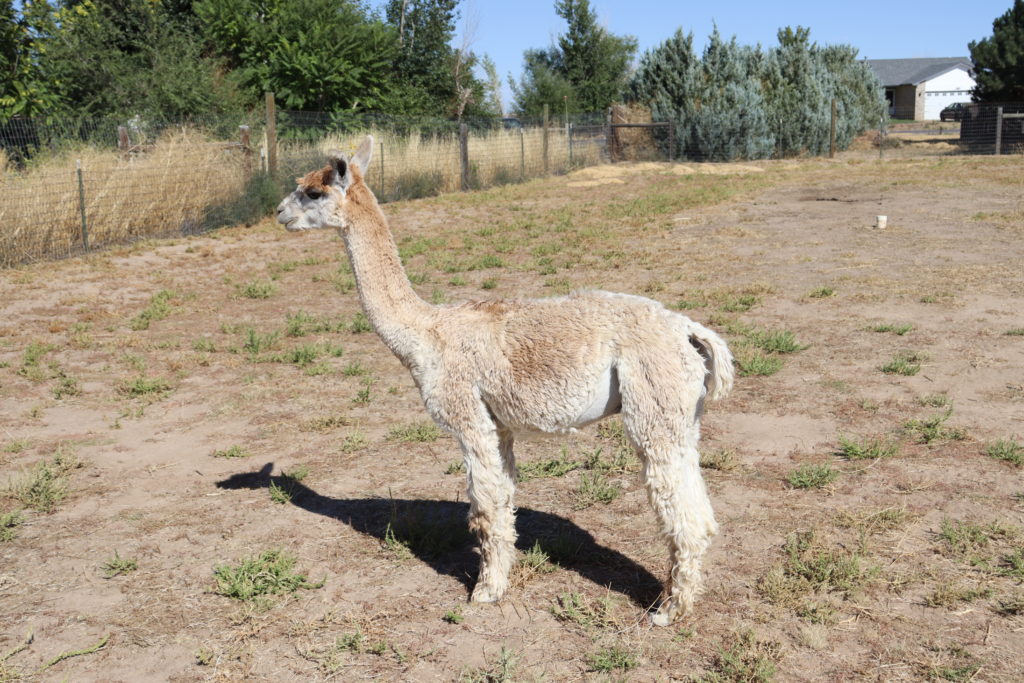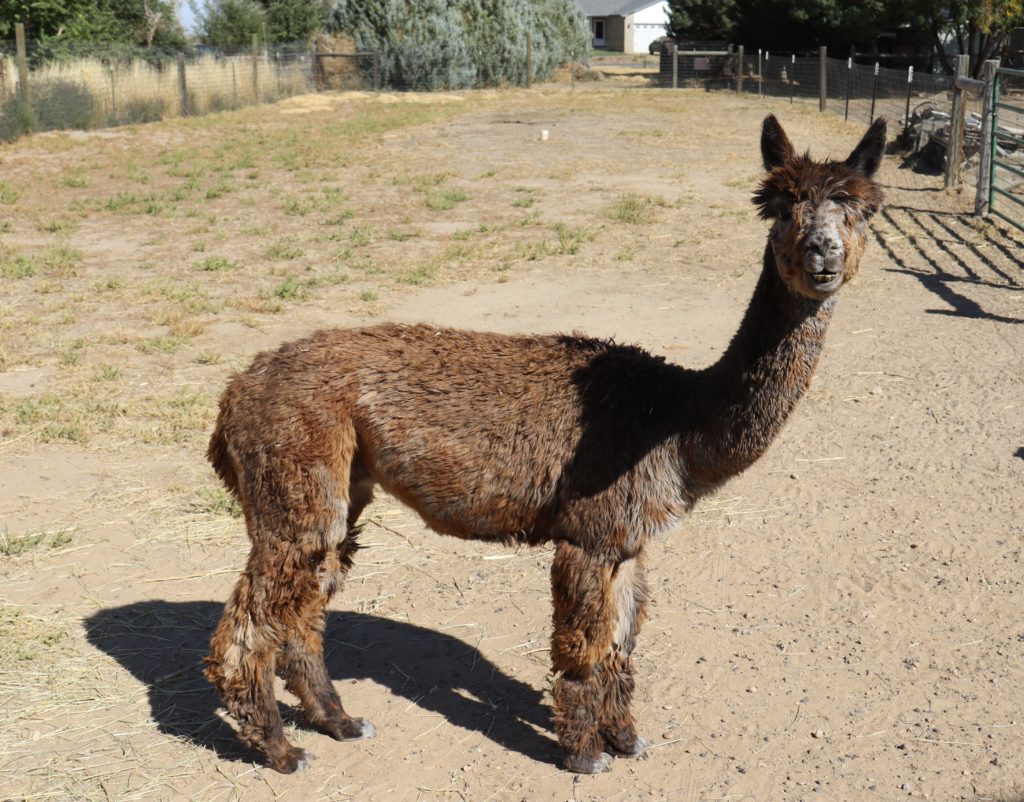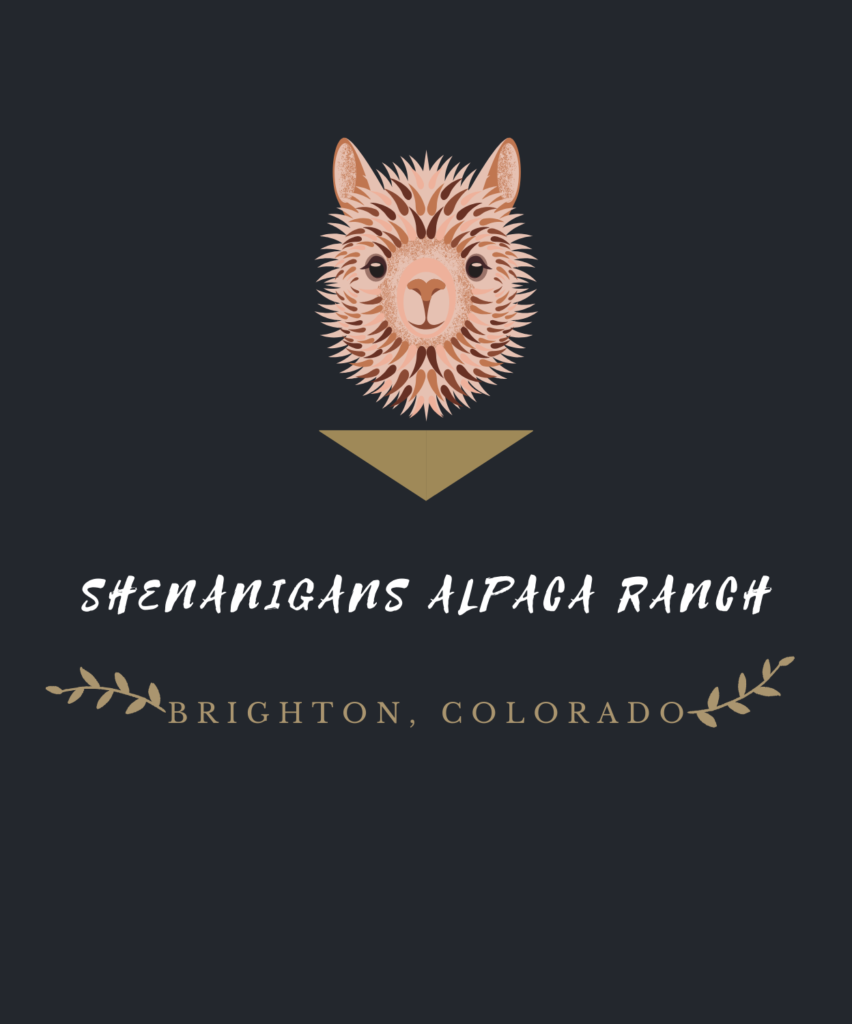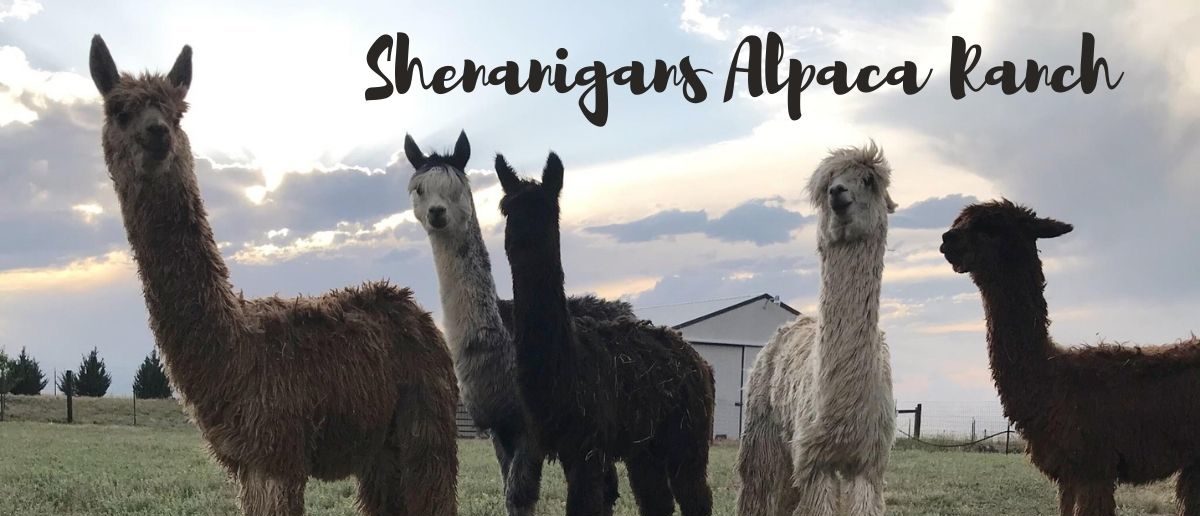Alpacas do not have a breeding “season”—it is the the act of mating and the presence of semen that causes females to ovulate—so they can be mated at any time of the year. The average gestation period is 11½ months, give or take two weeks, but pregnancies that go for over a year are not uncommon. Attention should always be paid to weather and climate concerns anticipated at the expected time of birth.
Though some animals will fall outside these ranges, females generally become sexually mature (both physically and mentally) at around 12 to 18 or 24 months of age and once they reach 90 to 100 pounds in weight; males can sometimes display sexual interest at just a few weeks of age, but they are not usually fertile and capable until 18 months to 3 years of age. Alpacas at Shenanigans Alpaca Ranch will be of an appropriate age, weight, and capability.
Typically, births are trouble-free and occur around the middle of the day. Mothers are often very protective and the cria will stay with its mother until weaning is complete at 5 to 6 months of age. Females, if they are willing, can be re-mated 2 to 6 weeks after giving birth.
Pairing and Characteristics
Color is often the primary characteristic considered when breeding alpacas, and established pedigrees will reveal what colors exist in a registered animal’s background. While color genetics is not an exact science, use of this data (available for all stock at Shenanigans Alpaca Ranch) can assist in breeding choices. Fleece characteristics—such as coverage, density, fineness, crimp, and brightness—are another frequent consideration.
Additional physical traits—including body scoring and proportions, bite alignment, and general temperament—are attributes for consideration, as well. Does the stud you are considering have progeny on the ground that can be assessed? What traits does this particular male pass on to his offspring? What traits are associated with the female’s offspring? Are any negative traits associated with either alpacas’ backgrounds?
Current Breeding Stock at Shenanigans
xx Do we need any sort of introduction here ??

Good bloodlines!
Bijou Kobe’s Gold
Suri | Male | Proven | Light Rose Gray
ARI# 35233879 | D.O.B. 8/5/2015
Purchase Price: $2000
Stud Fee: $750
Sire: Kobe of PVA
Dam: GLR Atacama
xxExtended DescriptionXX
Secondary Color: Light Fawn
Certificate | EPD/Histogram
Updated 9/20/2021

Good bloodlines!
Bir’s Durango
Suri | Male | Proven | Dark Fawn
ARI# 35410867 | D.O.B. 6/17/2017
Purchase Price: $2000
Stud Fee: $750
Sire: MMALP Goldstar’s Bojack
Dam: Bir’s Chipeta by Silver Jack
xxExtended DescriptionXX
Secondary Color: Light Fawn
Certificate | EPD/Histogram
Updated 2/15/2023

Good bloodlines!
Bir’s Escalante
Suri | Male | Unproven | Bay Black
ARI# 35572909 | D.O.B. 8/1/2019
Purchase Price: $1000
Stud Fee: $500
Sire: Bir’s Troublesome
Dam: Bir’s Aurora by Accoyo Goldstrike
xxExtended DescriptionXX
Secondary Color: None
Certificate | EPD/Histogram
Updated 2/15/2023
General Terms and Conditions
- All breeding efforts will take place at Shenanigans Alpaca Ranch in Brighton, Colorado.
- All alpacas at Shenanigans are AAI registered, most are BAS registered. All come with a veterinary health certificate and are up-to-date with examinations, care maintenance, and vaccines; additionally, all alpacas are healthy and free of disease, capable of reproduction, and self-insured or covered by full-mortality insurance. Unless indicated otherwise, female alpacas that are available for breeding have never experienced problems with becoming pregnant, maintaining pregnancy, or giving birth; have never given birth to a stillborn cria or a cria with a congenital defect; and have no known history of congenital defects in her lineage.
- Owners of visiting animals may review any relevant health and reproduction records. Shenanigans Alpaca Ranch guarantees that all relevant records are authentic and, to the best of the ranch operators’ knowledge, its animals are free of injuries or diseases or congenital problems as of a date of agreement. If requested, the ranch operators will disclose to the visiting animal’s owner all material facts known by the ranch and will provide all information available about the quality, health, and location of offspring. Likewise, any information requested by Shenanigans Alpaca Ranch will be expected and reviewed; all information should reflect the same level of accountability.
- Owners of visiting animals represent either that their alpacas are insured with a “full mortality” insurance policy or that they are acting as their own self-insurer both as to mortality and also as to any injury or event causing a loss of value that may occur. Visiting owners further agree that their sole remedy, in any event causing a loss of value, shall be to make claim against any insurance policy that they have acquired. Should the visiting owner fail to acquire such insurance and hence act as their own self-insurer, they shall be deemed to have waived any claim against Shenanigans Alpaca Ranch and its owners both as to mortality and as to any injury or event causing a loss of value of alpacas that may occur.
- Shenanigans Alpaca Ranch reserves the option to terminate breeding efforts if, between time of agreement to breed and time of breeding, an animal’s condition changes or if its behavior is deemed likely to prevent successful breeding or if breeding efforts become likely to cause disease, damage, distress, or disruption to other animals or persons.
- If Shenanigans Alpaca Ranch should decide to terminate an agreement prior to completion of the breeding effort, no breeding fees will be required of the visiting alpaca’s owner; other costs, including boarding and any documented expenses incurred by Shenanigans on behalf of the owner, must be paid by the owner before visiting animals are removed.
- Other than the following “live birth” guarantees, Shenanigans Alpaca Ranch accepts no liability for congenital defects or other abnormalities in offspring that result from breeding efforts—the visiting owner assumes all risk inherent in the breeding process. That said, Shenanigans Alpaca Ranch guarantees:
- Females have not been exposed to any stud for at least 30 days prior to breeding effort and are not pregnant.
- If a female alpaca does not maintain the initiated pregnancy, Shenanigans will provide a subsequent breeding for that female with the same herdsire at no cost for an additional breeding fee. The cost of ultrasound testing and transport fees will be charged to the owner under the same terms as imposed elsewhere in written agreements.
- If a female is found to be unable of conceiving a pregnancy, breeding efforts may be transferred to another female within 60 days of this finding.
- If a female loses a fetus or its cria and becomes unable to conceive or dies before or during birth, Shenanigans will provide a subsequent breeding effort with the same male to another of the visiting owner’s females at no additional breeding fee; however, as stated elsewhere in a written agreement, the cost of boarding, ultrasound testing, and transport fees will be charged to the owner.
- If a male’s offspring from a female dies at birth or does not survive for 14 days after birth, Shenanigans Alpaca Ranch will provide a subsequent breeding with the same male to the same female with no additional breeding fee; however, as stated elsewhere in a written agreement, the cost of boarding, ultrasound testing, and transport fees will be charged to the owner.
- If re-breeding is required and the same male is incapable of or unavailable for breeding, Shenanigans Alpaca Ranch will provide a breeding with another herdsire of the visiting owner’s choice under the same terms as an established, in-effect agreement. If the visiting owner selects a herdsire whose breeding fee is greater than that of the original herdsire selection, the visiting owner will pay any difference; otherwise, no additional breeding fee will be charged. Any ultrasound and transport costs or other expenses incurred on behalf of the visiting owner will be paid by the visiting owner before visiting animals are removed.
